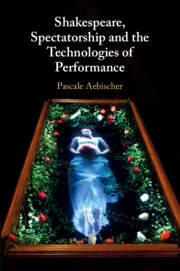Book contents
- Shakespeare, Spectatorship and the Technologies of Performance
- Shakespeare, Spectatorship and the Technologies of Performance
- Copyright page
- Contents
- Figures
- Tables
- Acknowledgements
- How to Read This Book
- Introduction
- Part I Candlelight and Architecture at the Sam Wanamaker Playhouse
- Part II Digital Technologies and Early Modern Drama at the National Theatre and the RSC
- Part III ‘Invisible’ Technology and ‘Liveness’ in Digital Theatre Broadcasting
- Chapter 5 Hamlet in Parts: Robin Lough’s RSC Live Cinema Broadcast of Simon Godwin’s Hamlet (8 June 2016)
- Chapter 6 Offstage Dynamics and the Virtual Public Sphere in Cheek by Jowl’s Live Stream of Measure for Measure (2015)
- Concluding Most Obscenely: Offstage Technophelias
- Bibliography
- Index
Chapter 5 - Hamlet in Parts: Robin Lough’s RSC Live Cinema Broadcast of Simon Godwin’s Hamlet (8 June 2016)
from Part III - ‘Invisible’ Technology and ‘Liveness’ in Digital Theatre Broadcasting
Published online by Cambridge University Press: 10 April 2020
- Shakespeare, Spectatorship and the Technologies of Performance
- Shakespeare, Spectatorship and the Technologies of Performance
- Copyright page
- Contents
- Figures
- Tables
- Acknowledgements
- How to Read This Book
- Introduction
- Part I Candlelight and Architecture at the Sam Wanamaker Playhouse
- Part II Digital Technologies and Early Modern Drama at the National Theatre and the RSC
- Part III ‘Invisible’ Technology and ‘Liveness’ in Digital Theatre Broadcasting
- Chapter 5 Hamlet in Parts: Robin Lough’s RSC Live Cinema Broadcast of Simon Godwin’s Hamlet (8 June 2016)
- Chapter 6 Offstage Dynamics and the Virtual Public Sphere in Cheek by Jowl’s Live Stream of Measure for Measure (2015)
- Concluding Most Obscenely: Offstage Technophelias
- Bibliography
- Index
Summary
By the time the screening of Robin Lough’s broadcast of Hamlet, directed for the RSC’s main stage by Simon Godwin, was announced for 8 June 2016, much of the novelty of theatre broadcasts had worn off. This would be Lough’s tenth broadcast for RSC Live from Stratford-upon-Avon, and the fourth Hamlet screened in arthouse cinemas in the UK and internationally in quick succession. Rory Kinnear’s performance, broadcast from the National Theatre in 2010, was rapidly eclipsed by the extraordinary star appeal of Cumberbatch at the Barbican in 2015, which itself had to compete against the sensational cross-gender casting of Maxine Peake in the role the same year in a production pre-recorded, also by NT Live, at the Royal Exchange, Manchester. The unique selling point of the RSC’s offering in this crowded market was the casting of Paapa Essiedu, a British performer of Ghanaian descent, as Hamlet in an almost exclusively BAME cast. In the wake of a prominent study of racially diverse casting by the University of Warwick and of pressure by Arts Council England ‘to address workforce diversity’, and hot on the heels of Iqbal Khan’s 2015 production of Othello featuring Hugh Quarshie’s and Lucian Msamati’s black Othello and Iago heading a multi-racial cast, this Hamlet contributed to the long overdue re-dressing of the balance after years of discriminatory casting in mainstream British theatre, regardless of commitments to ‘colour-blind’ casting in previous decades. By December 2016, the RSC’s leadership team would proclaim that they were ‘proud to be one of the organisations who have led the way in diverse casting and [were] thrilled to see more BAME actors in leading roles on our stages, though we know there’s more to do on many fronts’.
- Type
- Chapter
- Information
- Shakespeare, Spectatorship and the Technologies of Performance , pp. 157 - 190Publisher: Cambridge University PressPrint publication year: 2020



